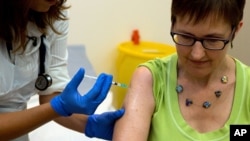As early as 2003, researchers at the U.S. National Institutes of Health knew what made the Ebola virus tick, and animal experiments of candidate vaccines showed promise.
The problem, according to infectious-disease specialist William Schaffner of Tennessee's Vanderbilt University School of Medicine, was a lack of funds to begin human clinical trials.
“Once you have the candidates, if you think they are going to work - for example, you’ve put them into a few monkeys or mice or dogs or whatever and it looks like it’s going to work and there’s a biological reason for them to work - you’ve got to test them in humans," Schaffner said. "At that point, the costs go through the roof.”
Schaffner said getting big pharmaceutical companies to fund a trial of an experimental vaccine is very difficult. Few are willing to spend the money on a drug that will benefit only a small number of people.
That was the case for the Ebola vaccine. Outbreaks of the disease since it was identified in 1976 had been sporadic and limited to only a few thousand cases. That changed this past summer, when the viral illness began spreading unchecked from its epicenter in Guinea to neighboring Liberia and Sierra Leone.
Until the current crisis, Schaffner said, there had not been a way to conduct human clinical trials.
“You give half the people the vaccine, half the people don’t get the vaccine - they get a placebo - all with informed consent, and then you see who gets sick," he said. "And if the vaccinated people don’t get sick, well, the vaccine works. But if you don’t have outbreaks of disease, how are you going to test the vaccine?”
Two experimental vaccines are undergoing early safety trials, with trials on another five reportedly set to start next year.
Two pharmaceutical giants - the U.S. firm Johnson & Johnson and Britain’s GlaxoSmithKline - have stepped forward, ready to manufacture more than 1 million doses of whatever vaccine is approved.
More than 9,900 cases of Ebola have now been reported in Liberia, Guinea, Sierra Leone, Nigeria and the United States. Doctors just diagnosed the first case in Mali. A spread of the virus to more impoverished African countries "would be enormously tragic - not just on the humanitarian side, but it would destabilize governments, have very adverse effects on economies," Schaffner said.
Meanwhile, Schaffner said, there is little danger of the virus spreading to developed countries. He noted that infections in such areas have mostly been confined to a handful of health care workers.




